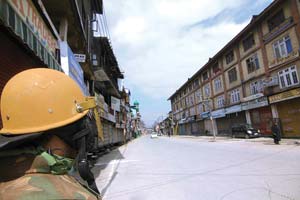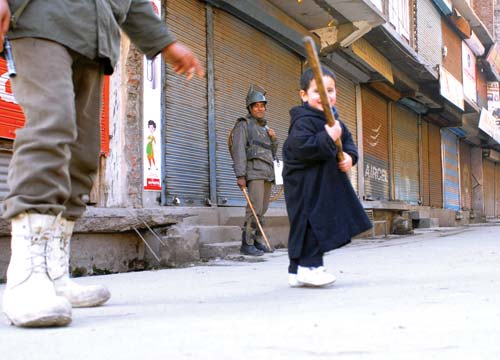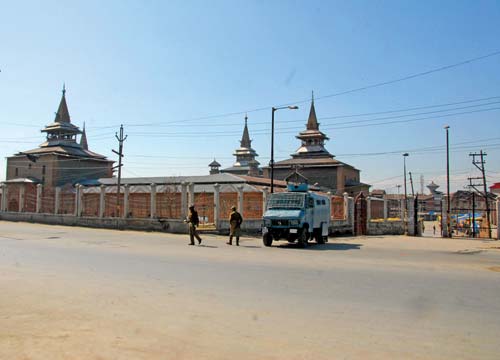Events starting with the execution of Afzal Guru have led Kashmir to a situation in which it is either a call for a protest strike or a curfew. Business and education apart, it has started impacting sections of the students studying in the mainland. Even Chief Minister Omar Abdullah made an emotional admission of his helplessness, Shams Irfan reports.

Kashmir is on the boil, once again. Anger triggered by the secret hanging of 2001 Parliament Attack convict Afzal Guru at New Delhi’s Tihar jail was far from over that the mysterious death of a Kashmiri scholar in Hyderabad brought the people on the roads. The state’s security apparatus was quick to clampdown on protestors. People are being prevented from moving out. Curfew has become order of the day. Four people have been killed in protests so far. In certain cases, security forces have ransacked houses and properties for no reason.
Even Jammu and Kashmir’s chief minister Omar Abdullah could not hide his helplessness in the state assembly when he almost broke down after learning about the death of a youth in north Kashmir’s Baramulla. Choosing his words carefully, Omar, without naming anyone, said he is tired of giving answers to people after such incidents. Visibly upset, Omar questioned the need for opening fire on protesters who clashed with security forces in old town of Baramulla, resulting in the death of a 25-year-old Tahir Rasool Sofi.
While Omar’s emotional outburst in the state assembly over Tahir’s death earned him headlines in the national press, it failed to impress people back home. The inability to rein in the security forces which are under the control of Unified Headquarters that Omar heads became talk of the town. Once referred to as the young and dynamic leader by the party loyalists and friends in New Delhi, Omar had to sink his head in frustration for not being able to do anything. In last four years, since Omar took charge of National Conference-led coalition government, he had to chew his words more often then he uttered them.
The opposition Peoples Democratic Party didn’t waste an opportunity to score a brownie point. Taking full advantage of his situation, senior PDP leader and former deputy chief minister Muzaffar Hussain Beg called Omar a “third grade daily wager” of New Delhi.

It was not Tahir’s death alone that has started the cycle of protests which have now spread across the length and breadth of Kashmir valley. Kashmir was on the edge ever since Afzal Guru was secretly executed at Tihar jail. The manner in which Guru was hanged without even giving him one last chance to meet his family irked Kashmiris like never before. The entire young Kashmiri generation who were born and brought up in conflict saw in Afzal a reflection of their own unfulfilled desires and injustices meted out to the ordinary people.
The inability of Omar to press New Delhi to hand over Guru’s mortal remains to his family further infuriated people. Strangely, after Guru’s execution, though not overtly but covertly, people pinned their hopes on Omar for standing up for them at least once.
Omar, on the other hand, was well aware of the fallouts of Guru’s hanging in Kashmir. Hours after Guru’s hanging, he hurriedly called a press conference at his Srinagar residence to clarify that he has not signed Guru’s death warrant.
For days after the execution, Omar took refuge in micro-blogging site Twitter to reach out to the people. With curfew imposed in almost every part of Kashmir and people forced to stay indoors for days, Omar hoped that things will roll back to normalcy once helplessness overrules sentiments. And he was right, although to an extent.
But it was not sentiments that were overruled by people’s helplessness but the inability of separatist leadership to think beyond hartal calendars which have lost significance with the ordinary people. The state administration was happy that curfew, restrictions, harassment and nocturnal raids had finally paid.
After the death of two youth in Sumbal, Sonawari, which the state government claimed had happened due to drowning of a boat they were rowing in on February 10, life has started to roll back to normalcy. Shops were opened and people once again filled streets and business started picking up after days of shut down and curfews. Flights carrying tourists were packed. It was business as usually once again. Everybody thought Kashmir has moved on.
But the news of a 29-year-old Kashmiri boy pursuing Ph.D in English in English and Foreign Languages University, Hyderabad, who was found dead in his hostel room under mysterious circumstances shattered the fragile calm in the valley.
Initial reports suggested Mudasir Kamran, a resident of Parigam village in district Pulwama, was part of protest that took place in Hyderabad over Afzal Guru’s hanging. After Guru was executed, Kashmiri students studying in different states of India, although in minority, came out to protest and raised anti-India and pro-freedom slogans. At many places, Kashmiri students became target for Hindu right wing activists.
The Muttahida Majlis e Mashwarat (MMM) or a joint advisory council of Kashmir’s separatist parties which was formed to spearhead agitation to get back Afzal’s mortal remains from New Delhi’s Tihar jail, quickly blamed Hindu fanatics for Mudassir death.
In a damage control bid, the Hyderabad police quickly negated MMM’s theory and termed Mudassir’s death as a simple case of suicide. Given the credibility of the state administration among common Kashmiris, the Hyderabad police’s story of Mudassir’s suicide found no takers. MMM then announced a fresh protest calendar asking people to observe complete shutdown on March 5 and also issue a call asking the people to rally towards Pulwama to express solidarity with Mudassir’s family.
On the day of Pulwama Chalo, already angered by the mysterious death of Mudassir, Tahir was shot dead allegedly by 46 RR stationed at Baramulla, spurring the sentiments of injustice and alienation further.
The government has so far failed to quell protests in a restrained manner. The cycle of events bear resemblance to 2008, 2009 and 2010 unrests which claimed hundreds of innocent lives. With last two years witnessing record number of tourist arrivals in Kashmir, the present situation has already cut down the tourists arrivals considerably. In the first week of March, only 7200 tourists visited Kashmir against a daily average of around 10,000 Indian tourists per day. Many bookings were cancelled in wake of the prevailing unrest in the valley.

In last one month, since Afzal was executed, the state government was able to guarantee only 11 working days. For the remaining time, Kashmir was under strict curfew or closed because of strikes called by the separatist groups. The chain of events after the execution of Guru has unnerved the state government as curbs and restriction are being used as a weapon to force people from coming out on the streets.
The state government is yet to devise a strategy other than clamping down on protestors and placing barricades across the state which has crippled normal life. It has resorted to old tactics of using live bullets and firing teargas shells at protestors which, as the unrest in last decade has shown, further escalates the tension.
A helpless chief minister who declares in the state assembly that the security apparatus was beyond his control is the last thing that the vulnerable people of Kashmir want. After every killing, a fresh enquiry is ordered but so far not even a single security person has been prosecuted for the crimes. In 2010, more than 120 protestors were killed. Instead of booking the security forces, the state blamed the ordinary people for carrying out protests. Denial of justice and prosecution of youngsters under draconian laws like Public Safety Act (PSA) has left an entire generation polarized and on the edge.
Whenever the situation starts to turn ugly in Kashmir, Omar urges New Delhi to revoke Armed Forces Special Powers Act (AFSPA) from relatively peaceful areas. Recently, he compared his campaign for revocation of AFSPA to that of Irom Sharmila Chanu of Manipur, who has been fasting against the law since last 12 years.
“If one woman can be on fast for 12 years for removal of AFSPA… if I am speaking against it for the last one year, it is nothing. I will continue doing that.” But in a recent statement, the Union Home Minister Sushil Kumar Shinde embarrassed Omar Abdullah by stating that there has been no formal request from Jammu and Kashmir government for scrapping the act. With AFSPA losing its sheen in the valley, Omar government is desperate to find ways to connect with the curfewed people. He has very few options at his disposal.

The opposition PDP is gunning for Omar. But this is not the first instance when Omar had to face heat for his inability to convince New Delhi to restrain security forces from using excessive force against unarmed protestors. His emotional speech in the state legislature was an open admission he is was helpless as any other person in Kashmir when it comes to talking sense to security forces. There were rumours that Omar might submit his resignation but he has already put a lid on the rumour-mill.
While paramilitary forces, J&K police and CRPF are on a rampage across the valley particularly in downtown Srinagar and Sopore with reports of ransacking and nocturnal raids, an eerie calm prevails in the valley. More than 192 people have been injured in south Kashmir alone. An agitated resident of old city went so far as to blame the state government for treating Kashmir as its colony which they shut down at will. “The forces have been given a free hand by this government to barge into our houses at all hours and damage our properties,” the angry resident who didn’t wish to be named, told Kashmir Life over phone.
“What answer will I give to my people; the questions they are raising. I want to put these questions to myself today. Why? Why”, an emotionally charged Omar said in the assembly.
Echoing Omar’s frustration, Divisional Commissioner Kashmir, Dr Asghar Samoon said he was at loss to understand how they (CRPF) act independently when Standard Operating Procedures (SOP) has been set for them. “I want to assure the people that whosoever indulges in excesses will face the music,” he said.
The state government has extended school holidays till March 10 on the pretext of bad weather when Kashmir is basking in sunshine. It expects the agitated people to calm down. And rather than making delivery of justice possible and bringing culprits to justice, it has again used old tactics to quell the frequent protests taking place in towns and villages across Kashmir valley. If the situation continues to remain where it is now; the unending cycle of violence, killing of protestors, harassment, curbs on movement, curfew, ransacking of houses owned by ordinary people, it seems another year of unrest is round the corner.
















What is the way out sir??? How long will India treat us like this ???
………till we get freedom!